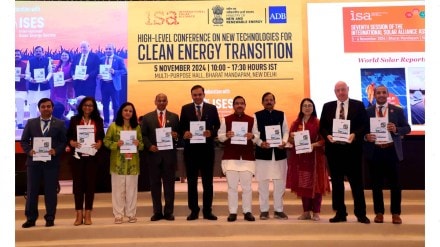India has been re-elected as the President of the International Solar Alliance (ISA) during the seventh session of the ISA Assembly, underscoring its pivotal role in global solar energy initiatives. The leadership reshuffle positions India to continue shaping the future of solar energy while fostering international collaboration to address pressing energy challenges.
A New Leadership Structure
The recent Assembly, held from November 5 to 7, saw India as the sole candidate for the presidency, reinforcing its leadership in solar energy advocacy. In contrast, the Co-Presidency was a competitive race between France and Grenada, with France emerging victorious. The Assembly is guided by its Rules of Procedure, which ensure equitable representation among the ISA’s member countries.
In a significant development, Ashish Khanna, a seasoned World Bank energy specialist, is set to succeed Dr Ajay Mathur as ISA Director General in 2025. Khanna brings over 26 years of experience in energy sector development across various developing nations, positioning him as an influential figure in advancing the ISA’s mission.
India’s Vision for Solar Energy
At the opening of the Assembly, India’s Minister for New and Renewable Energy, Pralhad Joshi, highlighted the ISA’s recent accomplishments and its growing significance in reshaping the global energy landscape. “Solar energy, once an ambitious vision, has become a powerful reality,” he stated, illustrating the transformative journey of solar power from concept to execution.
Joshi revealed that the ISA has successfully completed 21 out of 27 demonstration projects aimed at showcasing solar power’s potential, particularly in Least Developed Countries (LDCs) and Small Island Developing States (SIDS). “These successful projects are a testament to our shared commitment to a sustainable future,” he remarked, emphasizing the importance of collaboration in achieving these goals.
Equitable Representation and Regional Focus
The Assembly elected not only the President and Co-President but also established a diverse leadership structure with eight Vice Presidents representing various regions. This approach ensures equitable geographical representation across the ISA’s four regional groups: Africa; Asia and the Pacific; Europe and Others; and Latin America and the Caribbean.
Ghana and Seychelles were appointed as Vice Presidents for Africa, while the Commonwealth of Australia and Sri Lanka took the positions for Asia and the Pacific. Germany and Italy will represent Europe and the Others region, with Grenada and Suriname representing Latin America and the Caribbean.
Solar Energy Growth: Key Reports Unveiled
During the Assembly, significant reports focusing on global solar growth, investment trends, and technological advancements were unveiled. The World Solar Market Report highlighted a remarkable increase in global solar capacity, which surged from 1.22 gigawatts (GW) in 2000 to an impressive 1,418.97 GW in 2023. The report predicts that global solar capacity may reach a staggering 7,203 GW by 2030, with solar jobs expected to rise to 7.1 million.
The World Investment Report underscored a notable shift toward sustainable energy investments, increasing from $2.4 trillion in 2018 to an anticipated $3.1 trillion by 2024. Solar energy leads this investment trend, accounting for 59% of total renewable energy investments, driven by decreasing costs and a growing appetite for clean energy solutions.
Meanwhile, the World Technology Report showcased remarkable advancements in solar technology, including a record 24.9% efficiency in solar photovoltaic (PV) modules and significant reductions in silicon usage and utility-scale solar costs. These innovations are crucial for creating resilient and cost-effective energy solutions.
Green Hydrogen Potential in Africa
Another highlight from the Assembly was the Readiness Assessment of Green Hydrogen in African Countries, which explored the potential of green hydrogen to decarbonize industries heavily reliant on fossil fuels. Produced through renewable-powered electrolysis, green hydrogen presents a viable alternative to traditional energy sources, thereby supporting Africa’s transition to cleaner energy.
Strategic Discussions and Future Directions
The ISA Assembly serves as a vital decision-making body representing each member country. It convenes annually at the ministerial level, emphasizing the importance of collaborative governance in promoting solar energy deployment. This year’s discussions focused on critical issues such as energy access, energy security, and energy transition, aimed at addressing global energy challenges.
As the ISA continues to refine its governance structures, the Assembly, alongside the Standing Committee and Regional Committees, plays a crucial role in fostering cooperation among member nations. These engagements not only enhance collaboration but also pave the way for innovative partnerships that will drive the ISA’s objectives forward.
